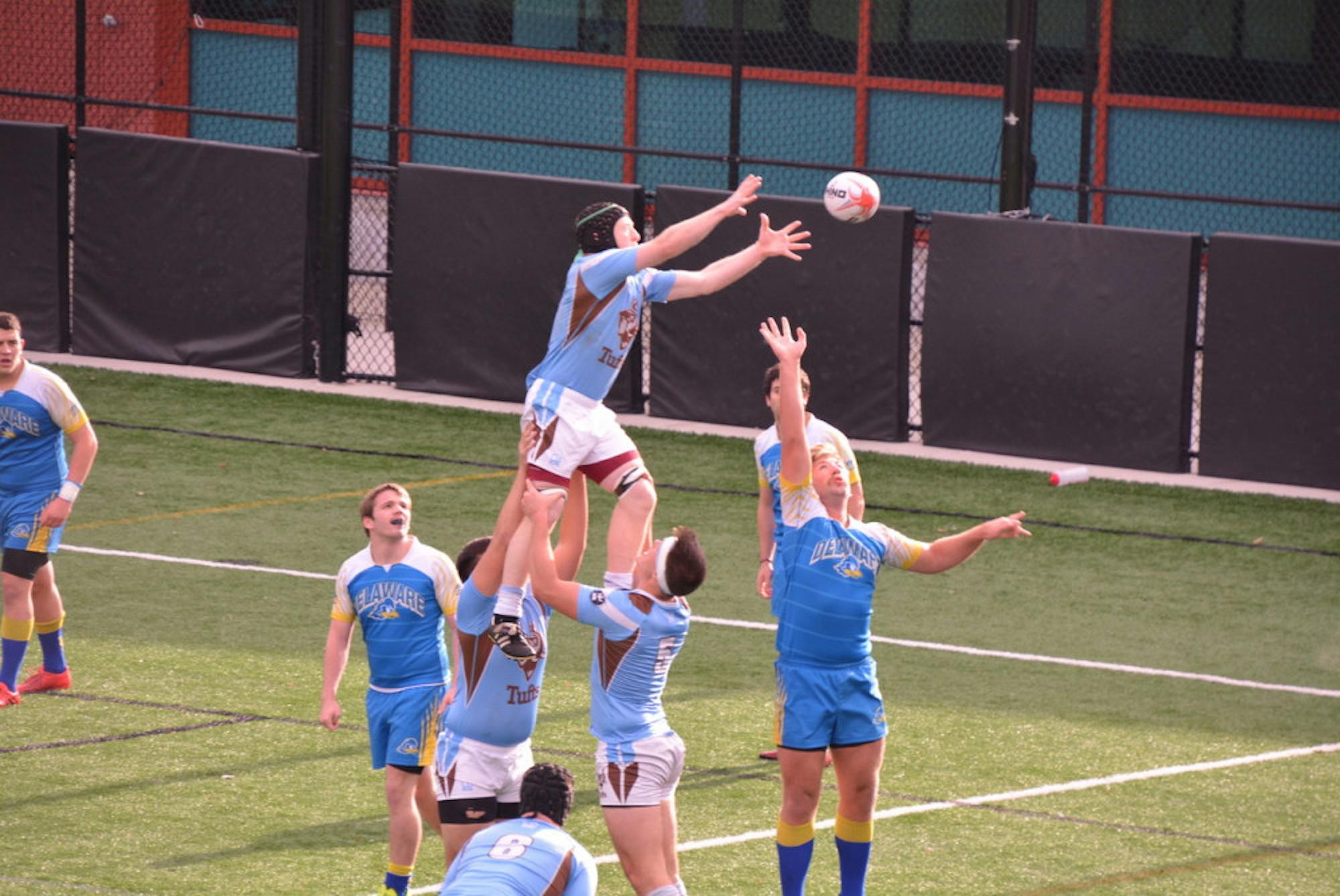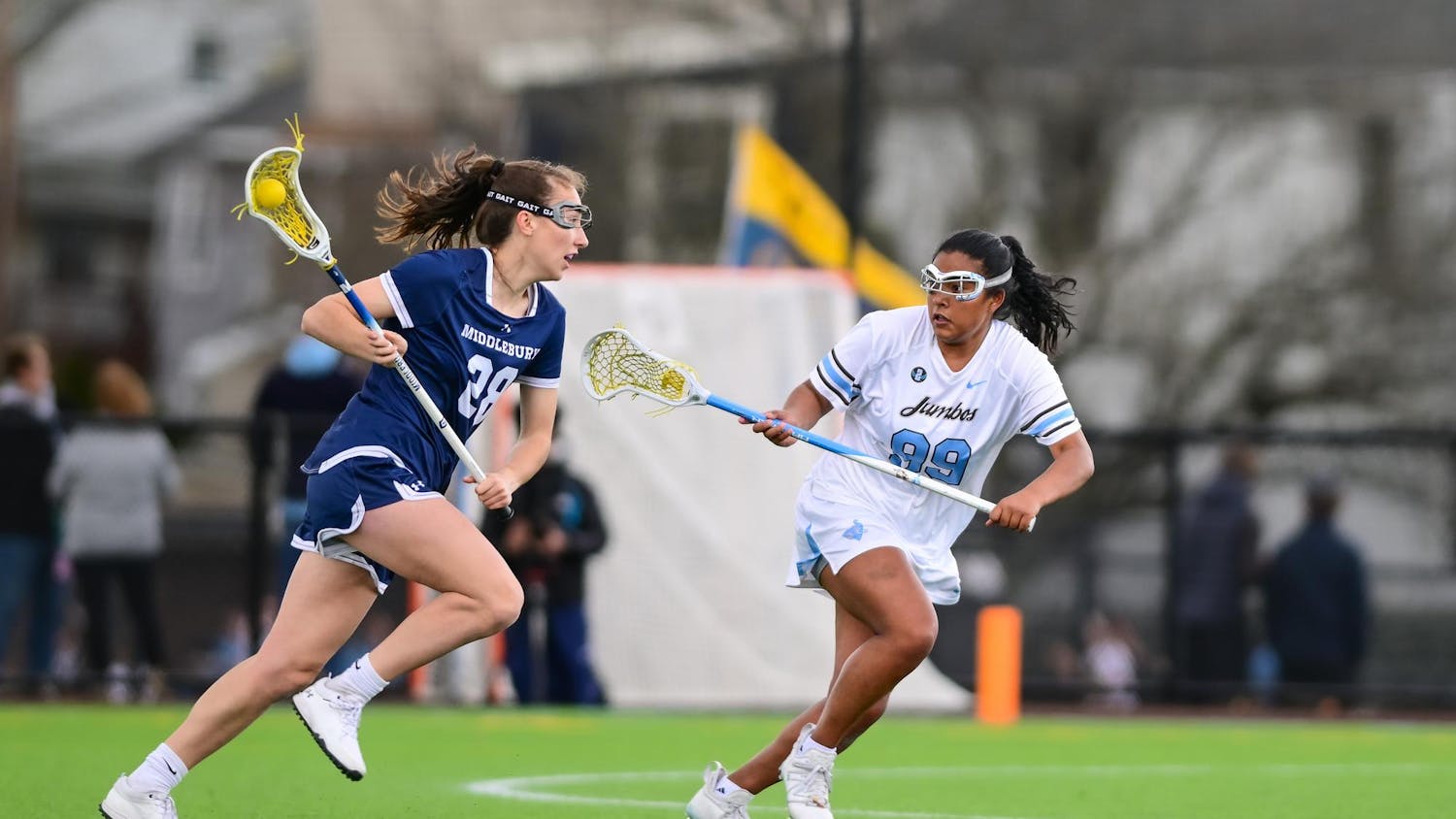When the Tufts club rugby team took to the field this fall, many outsiders didn’t expect the Jumbos to score a single point, let alone win a single match. It was their first season in Div. I, after all, and the teams the Jumbos faced throughout the season were better manned, had more experience and had more resources. Despite the adversity, the Jumbos posted a 4–4 season, proving to critics and themselves that they have a bright future in the highest level of collegiate rugby.
After reaching nationals last year, the team was given an invitation to join the Div. 1A Liberty League, and the opportunity was difficult to pass up. Senior and inside center Henry Seidel commented on the move up to Div. I.
“I think it was honestly because we had the talent to do it. We had a really good season last year and had the players to do it, so we decided to step up to Div. I,” Seidel, the club president, said. “We kind of took the momentum of [last] season and said let’s build on that ... and get up to Div. I.”
But reaching nationals last year was no easy feat. In fact, it was unprecedented in Tufts rugby history: Last season was the first time since the team’s inception in 1966 that the team made it to nationals.
"Making it to nationals last year was definitely unprecedented," Seidel said. "I remember my freshman year, the captain said how we would make it to nationals, and I was like, 'That is so far away.'"
The road to nationals last year was not to be overlooked. Tufts had to first win its Div. III league, as well as a host of elimination-style playoff games, and then go to Colorado, where nationals were held. Although the Jumbos ended up losing in the final, they were proud of an incredibly successful season.
This year proved to be much more difficult, as expected with the transition to a more competitive league. The Jumbos, though, rose to the occasion. Backs captain Griffin Andersen commented on the team's mentality throughout the season.
“We played with a chip on our shoulder the entire season. We’re always the underdog. People look at us like we’re a nerdy school,” Andersen, a junior, said. “We had a coach say, when we went on our run last year through nationals ... ‘We’ve played nerdy teams like you before.’ We ended up beating them 65–3.”
The Jumbos' tough mentality, discipline and skill all contributed to a successful inaugural season in Div. I. Even though their win percentage was .500, coach Thomas Clark notes that they could have played a much easier schedule.
“We didn’t schedule any soft games. We could’ve gone out and scheduled games we knew we could win," Clark said. "As rugby players, you always want to play at the highest level, and I really give these guys credit because they chose to do that."
So what made quirky Tufts such a contender on the rugby field? One thing that has certainly helped was its excellent team organization. Because of a smooth leadership transition process, the Jumbos have ensured that they can build on each prior season. Two years ago, then-President Nick Nasser (LA '17) rewrote the team’s bylaws to ensure a smooth succession of presidents and vice presidents from year to year. Now, the sophomore or junior vice president automatically becomes president the following year, ensuring the team does not lose steam the next season.
“I had the benefit of seeing both sides of leadership throughout my time here. One was unorganized, in my freshman year. There weren’t set rules, [and] we got into a little bit of trouble that came out of disorganized leadership,” Andersen said. “Now, you’re learning the ropes junior or sophomore year as a VP. When you step up as president, you already have a relationship with club sports, [and] you know the ins and outs, so you’re not starting from scratch every year.”
The team has greatly benefited from this new system. Since the president already has leadership experience, there is no “waiting time” for him to adapt to the new role, and the team can hit the ground running in the late summer, when conditioning begins. But the disciplined organization of the team does not stop with efficient presidential succession; Seidel also delegates roles to subordinates to help improve the team in multiple areas.
“What we’re trying to do on our team is have multiple people participate," Seidel said. "We’re trying to have a head of recruitment, someone to lead our media and a head of philanthropy.”
First-year back Brendan Brennan was surprised at the discipline the leadership of the team displays. Brennan played football in high school, and he wanted to try something new in college. At first, he was unsure about how assimilating to a new sport would work — he had never even watched a rugby match before — but he soon realized the team was so well organized that it didn’t really matter.
“I think [the organization] makes it easy to come into the sport. It’s especially good because we have such organized practices. Leadership really helps get the word out,” Brennan said. “Because many players are playing for the first time and every sport is different, you need that organized group of dudes to show you the rugby atmosphere and how to play the sport.”
The organization is not limited to the team's functioning off the field: it is slowly becoming normal for the first-years' captain — a sophomore who is responsible for the team's first-year members — to turn into a backs or forwards captain the next season. As the first-years captain last year, Andersen attributes his success to studying under senior Jake Garrell, who is now the backs captain.
“I definitely benefited from [the succession process] because I was able to learn from my senior captain, Jake Garrell, last year and was able to look up to him and see how he led the team, stepped up and took control over practices and games and made decisions in high pressure times,” Andersen said. “Seeing all that happening makes it easier to transition.”
Although the succession of leadership has led to the Jumbos' success on and off the field, they still faced a number of challenges as a new Div. I program. Most glaring is their roster's lack of depth. Most teams that Tufts competed against this season not only have an A side and a B side, like the Jumbos, but also a C side. Compared to Tufts' roster of 43 players (including injuries), most other teams carry over 60. Furthermore, almost all of the players on the rugby team are playing rugby for the first time in their lives. Meanwhile, other Div. I teams recruit players and even provide them with scholarships. Because of the sport's steep learning curve, the Jumbos have trouble bringing quality players off their bench. Clark cites this factor as the biggest reason for their three-game losing streak in the middle of the season.
“It was really just our team depth. We really just didn’t have the bodies and had some key injuries. We just didn’t have the depth chart to pull guys up," Clark said. "We lost some continuity. In rugby, that’s really key, especially at this level."
As a result, Seidel believes it is of utmost importance for the Jumbos to focus on recruitment in the offseason.
“Now that we’re a Div. I program, we need to expand. We need more bodies because we don’t want to put in players who are inexperienced or injured because it’s such a risk," Seidel said. "We do our best to recruit. It’s really hard because a lot of ex-varsity athletes at Tufts don’t necessarily want to come play rugby. It's seen as a step down.”
Andersen also talked about the necessity of recruiting and explained the lengths the team has gone to in order to increase its numbers.
“Now that we moved up to Div. I, recruiting is much more important. Jimmy Carney, head of recruiting, was spearheading the recruiting efforts [earlier in the fall]. We went to [the pre-orientation program] Fitness and Individual Development at Tufts and talked to a bunch of kids there. On Matriculation Day, we handed out flyers for tryouts,” Andersen said. “We’re just working to get our numbers up. We’re competing against teams with 65 players, and we’re running with [fewer than] 40 once injuries start to pile up.”
Something that gives the Jumbos hope for team expansion and growth is their relationship with the Tufts club sports administration and, more specifically, the Assistant Director of Club Sports and Intramurals Matt Callahan. Callahan, who took the position mid-October, has proven to be an invaluable resource for the Jumbos.
“Matt Callahan has been great for us," Seidel said. "He seems like he’s really into helping us improve. He knows the system and has already targeted areas where he thinks he can improve club sports. He’s already turning that office around. I’ve met with him many times. We’ve had some team meetings with him where we’ve addressed our concerns, talking about increasing roster size. I think now that they have a full-time director, things will run a lot more smoothly.”
The 2017 season was an experiment for Tufts rugby. The team knew it would be a huge step up from last year, and it rose to the challenge. While the Jumbos face difficulties as a smaller program, their excellent organization and leadership should only make them more successful in the years to come.
Club rugby succeeds in inaugural Div. I season

Freshman flanker Cormac McAdams jumps for a ball in a lineout against the University of Delaware.





